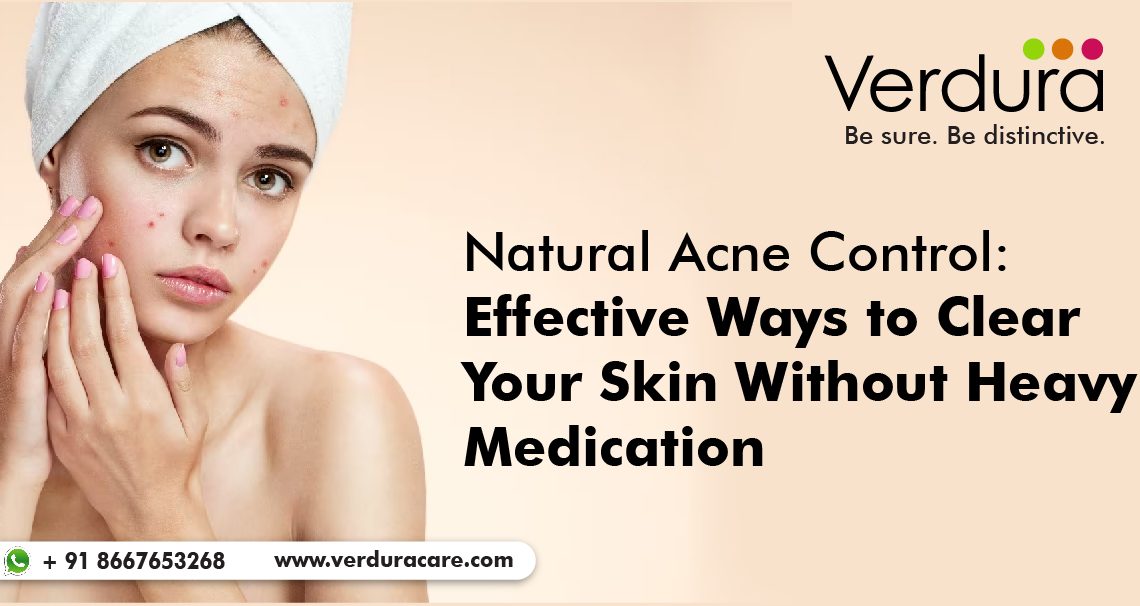Natural Acne Control: Effective Ways to Clear Your Skin Without Heavy Medication

Acne is a common skin condition that affects millions of people of all ages and genders. It occurs when the pores in your skin become clogged with oil, dirt, and dead skin cells, leading to pimples, blackheads, and whiteheads. While there are many over-the-counter and prescription medications available to treat acne, these treatments can be harsh on the skin and come with unwanted side effects. Fortunately, there are natural ways to control acne that are just as effective without the need for heavy medication. In this article, we will explore some of the most effective natural remedies for acne and how they work.
Keep Your Skin Clean
Keeping your skin clean is one of the most important steps you can take to control acne. This means washing your face twice a day with a gentle cleanser to remove dirt, oil, and bacteria. Avoid scrubbing too hard or using harsh products that can irritate your skin and make acne worse. Instead, look for gentle, non-comedogenic products that won’t clog your pores.
Use Tea Tree Oil
Tea tree oil is a natural antiseptic that has been shown to be effective in treating acne. It works by killing the bacteria that cause acne and reducing inflammation. To use tea tree oil, mix a few drops with a carrier oil like coconut oil and apply it to the affected areas with a cotton swab. You can also look for skincare products that contain tea tree oil as an ingredient.
Exfoliate Regularly
Exfoliating your skin is another important step in controlling acne. This process removes dead skin cells and unclogs pores, preventing new pimples from forming. However, be careful not to over-exfoliate or use harsh scrubs that can damage your skin. Instead, use a gentle exfoliating scrub once or twice a week.
Try Natural Remedies
There are many natural remedies that can be effective in controlling acne. Some popular remedies include:
Aloe Vera: Aloe vera is a natural anti-inflammatory that can soothe redness and inflammation caused by acne. Apply pure aloe vera gel to the affected areas and leave it on for 10-15 minutes before rinsing off.
Honey: Honey has antibacterial properties that can kill the bacteria that cause acne. Apply a small amount of honey to the affected areas and leave it on for 10-15 minutes before rinsing off.
Apple Cider Vinegar: Apple cider vinegar can help to unclog pores and reduce inflammation. Mix equal parts apple cider vinegar and water, and apply it to the affected areas with a cotton ball.
Eat a Healthy Diet

Your diet can have a significant impact on your skin health. Studies have shown that a diet high in refined carbohydrates and sugar can increase the risk of acne. On the other hand, a diet rich in fruits, vegetables, and whole grains can help to reduce inflammation and promote healthy skin. Additionally, some studies have suggested that consuming probiotics can help to reduce acne. Drink Plenty of Water
Manage Stress
Stress can trigger acne flare-ups, so it’s important to manage your stress levels. Stress causes the body to produce hormones that can increase oil production in the skin, leading to acne. Try practicing relaxation techniques like meditation, yoga or deep breathing exercises to reduce stress and promote relaxation.

Avoid Touching Your Face
Touching your face can transfer dirt, oil and bacteria from your hands to your skin, which can lead to acne. Avoid touching your face throughout the day and try to keep your hands clean. If you need to touch your face, make sure to wash your hands first.
Get Enough Sleep
Sleep is important for overall health, including skin health. Lack of sleep can lead to increased stress levels, which can trigger acne. Aim for 7-8 hours of sleep each night to promote healthy skin.

Use Sunscreen
Sun damage can cause inflammation and make acne worse, so it’s important to protect your skin from the sun. Look for a non-comedogenic sunscreen with an SPF of 30 or higher and apply it daily, even on cloudy days.
Don’t Pick at Your Acne
Picking at your acne can cause further inflammation and scarring, so it’s best to avoid it altogether. Instead, try using a spot treatment or cover-up to conceal blemishes.
Consider Supplements
Some supplements have been shown to be effective in treating acne. These include:
Zinc: Zinc has anti-inflammatory properties and can help to reduce the severity of acne. It’s available in supplement form and can also be found in foods like oysters, beef and pumpkin seeds.
Omega-3 Fatty Acids: Omega-3 fatty acids can help to reduce inflammation and promote healthy skin. They can be found in foods like salmon, walnuts and flaxseed.
Green Tea: Green tea contains antioxidants that can help to reduce inflammation and improve skin health. You can drink green tea or apply it topically to the skin.
Anti-acne packs can be an effective way to control acne without using heavy medication. One such product is the Verdura Anti Acne Pack, which is an effective cream for acne in a pack form. Verdura Anti Acne Pack is made with herbal ingredients such as tulsi and aloe vera along with bentonite, calamine, titanium dioxide and salicylic acid which have anti-inflammatory and antibacterial properties that will reduce acne and prevent it from recurring. Apply Verdura Anti Acne Pack for 15-20 minutes. Rinse off with water and pat your face dry.
Acnes can be a harsh to deal with but there are many natural ways to control it without the need for heavy medication. By keeping your skin clean, using tea tree oil, exfoliating regularly, trying natural remedies, eating a healthy diet, and managing stress, you can help to prevent and control acne naturally.